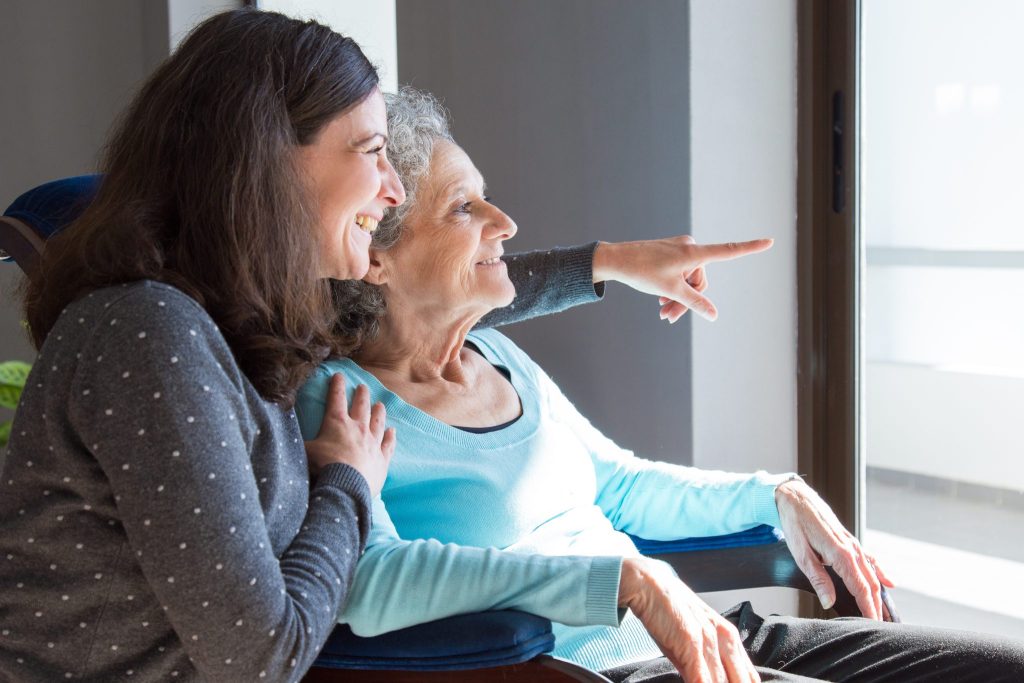Caring for elderly parents is a deeply personal and sometimes challenging journey, especially when you’re also balancing the needs of your own family. While it’s natural to want to provide the best possible care for your parents as they age, it’s also important to prioritise the wellbeing of your immediate family as well. Achieving that harmony at home requires careful planning, open communication, and accessing the support services available to help lighten your load.

Setting boundaries and communicating openly
Maintaining open communication with your ageing parents and your immediate family is important if you want to foster harmony at home. Sit down together to discuss everyone’s needs, concerns, and expectations openly and honestly, making sure everyone feels heard. Setting clear boundaries and realistic expectations from the outset can help alleviate potential conflicts and ensure that everyone’s needs are being met.
Encourage your parents to be open and honest about their wishes regarding their care preferences, living arrangements, and any specific support they may need. By involving them in the decision-making process and respecting their autonomy, you can help them to have a sense of empowerment and dignity as they navigate this new way of life.
Similarly, communicate openly with your immediate family about the challenges and responsibilities of caring for elderly parents. Be honest about the impact it may have on your time, energy, and emotional wellbeing, and work together to find solutions that prioritise the needs of everyone involved, as best you can.
Accessing support services
In Australia, there are numerous support services and government assistance programs available to help families navigate the complexities of caring for elderly parents while balancing their own family responsibilities.
My Aged Care is a government resource that is a great starting point for accessing government-funded Aged Care services – from in-home help to subsidies to help pay for permanent Residential Aged Care. Whatever your situation, specific needs, or background, they can help you to understand what types of services are available.
And Carer Gateway is a national service that provides information, support, and access to a range of services for carers, including counselling, respite care, and financial assistance. Carer Gateway can help connect you with local support services and provide guidance on accessing government-funded programs such as the Carer Payment, Carer Allowance, and Carer Supplement.

Prioritising self-care
While caring for elderly parents can be a deeply fulfilling experience, it’s important not to neglect your own wellbeing in the process. Prioritising self-care and setting aside time for rest, relaxation, and activities that bring you joy is not a selfish act – it will help you to maintain a sense of balance and prevent burnout.
Consider enlisting the help of family members, friends, or professional caregivers to provide Respite Care, allowing you to take breaks and recharge when needed. Remember that asking for help is not a sign of weakness, especially when ageing parents ask too much of you. Enlisting a team of supporters is a necessary part of ensuring that you can continue to provide the best possible care for your ageing parents while also caring for your own family.
Finding balance
Balancing the responsibilities of caring for elderly parents with those of your own family requires careful planning and flexibility. Identify your priorities and delegate tasks where possible to lighten the load. For example, involve your children in age-appropriate caregiving activities or enlist the help of other family members to share the responsibility.
Consider exploring flexible work arrangements or accessing carer-friendly workplace policies to accommodate your caregiving responsibilities while maintaining your career and financial stability. Many employers offer support for carers, such as flexible hours, telecommuting options, and access to employee assistance programs.
Caring for ageing parents while also nurturing your own family requires patience, compassion, and support. By fostering open communication, accessing available support services, prioritising self-care, and finding balance in your responsibilities, you can create harmony at home and ensure that both your ageing parents and your immediate family receive the care and attention they deserve. Remember that you are not alone on this journey, and there are resources and assistance available in Australia to help lighten the load and support you every step of the way.

Consider new options
There may come a time when being a full time carer for elderly parents while also juggling the demands of your own family life becomes too much. And that’s okay! You might like to consider trialling Respite Care to give yourself a break – either as a once-off or on a regular basis. This can allow you to rest and recharge your batteries, and it’s also a great opportunity to experience Residential Aged Care to see if it’s something that could be a solution in the longer term.
Many people have a picture in their mind of what Aged Care looks like, and trying Respite Care, or coming in for a tour of an Aged Care Residence to see what it’s really like can help remove some barriers to being open to the idea.
Want to learn more about Respite Care or arrange a tour of your nearest Aged Care Residence? You can speak directly with a TriCare Aged Care Specialist by calling 1300 874 2273.






